Sandy Lerner likes pushing boundaries. She made a fortune in the male-dominated high-tech industry, started a grunge cosmetics line, rescued Jane Austen’s brother’s house in England.
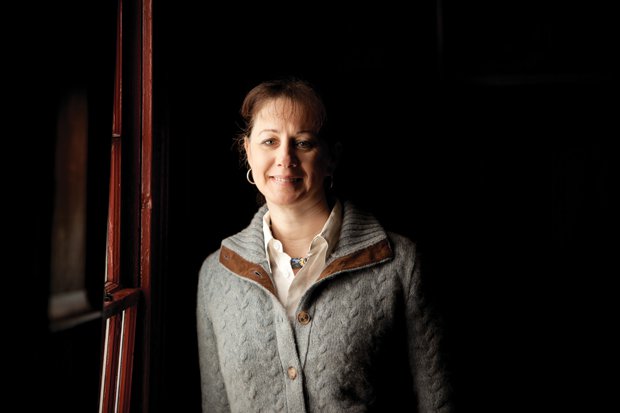
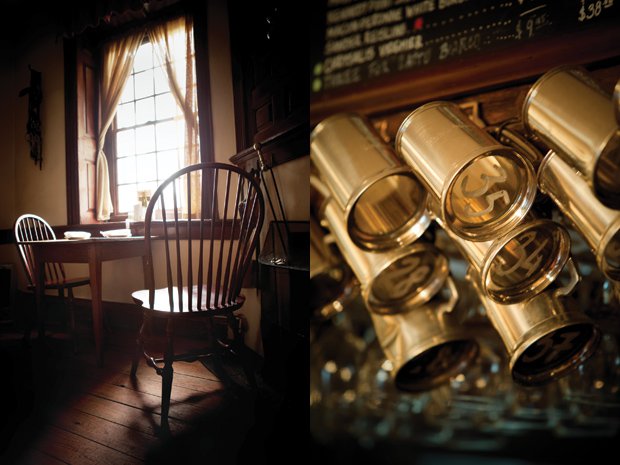
At the Hunter’s Head Tavern, a window seat and numbered mugs.

Lerner’s Home Farm store, in Middleburg, features an old-fashioned soda fountain, fine cheeses and more.
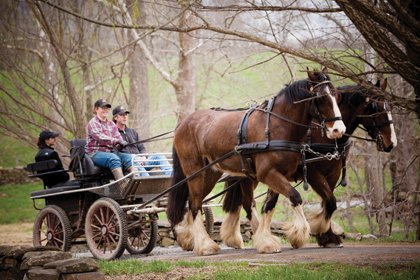
Shire horses are among the heritage breeds at Ayrshire Farm.
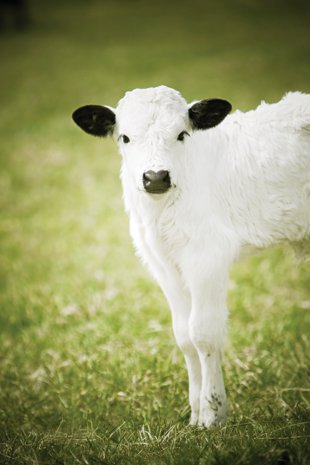
A White Park calf.
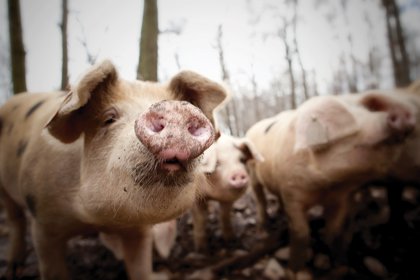
Gloucestershire Old Spot pigs.
On a rain-soaked March morning, Sandy Lerner is taking stock at Hunter’s Head Tavern, the 120-seat, English-style pub-with-a-garden that she owns in Upperville. Lerner likes to meet and greet friends at the pub, but its primary purpose is to showcase dishes, including Welsh rarebit and bubble and squeak, made from ingredients raised and produced at Ayrshire Farm—the 800-acre certified organic and humane livestock operation that she started in 1996, when she moved to Virginia. Above the bar where Lerner is seated hang dozens of pewter beer mugs, each inscribed with a number and the name of a regular patron. “It’s become cool to argue about what number you are,” says Lerner, who is sporting a girlish ponytail, blue nail polish and cowboy boots that hint at farm life.
According to Lerner, Hunter’s Head is “an extension of my own living room,” meaning, “everybody knows everybody.” A chalkboard advertises the specials of the day—the pot roast is her favorite—and there’s a Dutch door where customers wanting quick service can place their orders. They get a numbered wooden spoon in exchange, which is then laid on the table to signal the server where their fish and chips or bangers and mash should be deposited. “I have attention-surplus disorder,” quips Lerner. “I leave the business to other people and focus on things that interest me and that need to be done from a progress point of view.”
Lerner lives in horse country, but she is the antithesis of the traditional, demure estate owner. For one thing, she’s a Californian. She grew up in a place named Clipper Gap, northeast of Sacramento. More to the point, Lerner is an assertive person with an imposing intellect and unconventional interests—qualities that made her an entrepreneurial iconoclast. She likes pushing boundaries. She was a pioneer in the high-tech startup industry, a business dominated by men, and nowadays is intent on changing farming practices. In 1997 she posed nude, on horseback, for Forbes magazine. She says it “seemed like a good idea at the time. … Everyone else does the swimsuit issue of Sports Illustrated. I thought Forbes was more me.”
The Forbes photo session was a product, so to speak, of Lerner’s career. In the early 1980s, after earning a master’s degree in statistics and computer science at Stanford University, Lerner and her then-husband (now ex-husband), Len Bosack, conceived a way to communicate by e-mail from different locations within the labs at Stanford University, where they worked. The technology they developed was called the multi-protocol router, and it led Lerner and Bosack to co-found in 1984 a company named Cisco Systems, which soon became one of America’s most successful technology ventures and is now the worldwide leader in computer networking. Six years later, the CEO fired Lerner—and when Bosack heard of her dismissal, he left the company, too. The two sold their Cisco stock, pocketing $170 million.
Lerner wasted little time finding a new—and entirely different—career. In 1995, unable to find any green or purple nail polish on the market, and “tired of looking like a Barbie doll,” she started an irreverent, Laguna Beach-based cosmetics company named Urban Decay. It unveiled its grunge color line with the motto “Does pink make you puke?” Five years later, she sold the company to LVMH, the French luxury products giant, and over the last decade has concentrated her attention on philanthropic and investment activities, animal rights issues, and most especially on Ayrshire Farm, which features a 42-room Edwardian mansion completed circa 1912. Lerner doesn’t live in the manor house, which she calls the “guest house,” preferring to occupy a smaller “cabin” on the property.
For a computer scientist, Lerner seems something of an edgy old soul. She doesn’t own a TV—stopped watching it in 1968, she says, when The Addams Family went off the air. She likens television to watching other people’s news, and believes people should go out and make news of their own. She does not Tweet or spend time on social media websites; in fact, she only started reading her e-mail three years ago. She recently began to text, forced to do it after a storm compromised her phone service. A devotee of classic women’s literature, Lerner in 1992 bought and restored an estate once owned by Jane Austen’s brother, called Chawton House, in Hampshire, England. She has transformed it into the Center for the Study of Early English Women’s Writing, and is currently underwriting the digitization of the works of female authors who lived in England between 1600 and 1830. The 10,000 volumes, not all of them novels, include works by Austen, Mary Shelley, Frances Sheridan and Maria Edgeworth, among many others, as well as a collection of cookbooks by Quakers.
Lerner describes her passions as “tantrums.” By that she means that when a new idea or concept captivates her, she tends to immerse herself in it—sometimes for short periods, sometimes longer. Inspired by a her love of Austen, Lerner spent some 25 years dancing in the Regency style and herself made dozens of ball gowns. She helped to found the Piedmont Regency Dancers and has hosted balls at Ayrshire’s manor house. “I’ve danced in five centuries,” she says, adding that the hobby enabled her to imagine herself in one of Austen’s books.
Her latest venture, now nearly 15 years in the making, is altogether different. It has her digging deep into the compost-fertilized clay soil of Upperville, in the rolling hills of the Virginia Piedmont. Her property straddles the county line between Fauquier and Loudoun, and there Lerner is single-handedly challenging the tradition-bound paradigm of what she calls factory farming. Her integrated approach to producing meat, poultry, eggs, fruits and vegetables relies on systematic crop and livestock rotations, extensive composting and animal-friendly husbandry practices. They have earned Ayrshire recognition as Virginia’s first farm to be certified organic and humane.
“When I started this, most people thought I was from another planet,” she says. “But look at George Washington, Thomas Jefferson and Jethro Tull. They were all agricultural innovators with a deep commitment to developing better methods of farming, but they were terrible businessmen.”
Lerner, it seems, has the business side covered. Apart from her Cisco Systems windfall, she earned about $20 million from the sale of Urban Decay, from which she still sources copious quantities of blue nail polish. She employs close to 100 people, who work on the farm, in the pub and in the Home Farm store that she owns in downtown Middleburg. It is a gourmet retail shop housed in a stately old stone bank building. Inside, pristine glass butcher cases display pork loin for $19.99 a pound, veal loin chops for $21.99 per pound, boneless beef rib eye for $32, and ground beef in strands the thickness of bucatini noodles for $5.49 a pound. The store also sells ready-to-eat meals (made at the farm’s prep kitchen), produce and assorted products like cheeses, jams and honey sourced from local producers. Online and wholesale sales to retailers like the Alexandria-based chain Mom’s Organic Market contribute to the bottom line. Ayrshire Farm also caters events and offers cooking classes.
And now comes a new foray. Lerner has developed a new line of organic and humane food for dogs and cats that will be sold under the brand name Furry Foodie. Lerner says the pet food line should be on the market later this year.
Lerner, 54, was a vegetarian for 30 years, but she’s been lured back to pleasures of carnivorous eating by Chef Rob Townsend’s cooking at the Hunter’s Head Tavern. She unabashedly calls his food the best in Virginia, which must explain what she says is a recent 20-pound weight gain (hard to believe). “We don’t serve any structural food,” she says of the pub. “There’s not a tablecloth to be seen—it’s just good food.”
While agriculture remains a very big industry in Virginia—number one by dollar value—Lerner laments that there’s still no state infrastructure to promote sustainable farming, no class on sustainable farming at Virginia Tech. Sustainable farming, she says, is the agriculture industry’s “ugly stepsister”—an assertion that Tim Mize, an agricultural extension agent for Fauquier County, does not dispute.
Lerner grew to love animals as a youth. She spent considerable time caring for horses on a 108-acre California ranch and pear farm owned by two aunts. That experience fuels her desire to raise livestock in a humane fashion. At Ayrshire, the cows are kept outside, hemmed in by a lightly pulsating electric fence, and dine on high-quality grasses and legumes (including clover), rotating only among pastures where regrowth is sufficient for grazing. The animals are never far from water or shade. Newborn piglets are kept in a partitioned area with a toasty heat lamp, protecting them from their mother’s dangerous rollovers. The chickens are entertained 24-7 with piped-in music from the radio, a punchy mariachi number on the day of my visit. Ayrshire Farm processes and sells about 1,000 chickens weekly, mostly broilers, and sells eggs from heirloom breeds like Dominiques and Buckeyes. The chickens are slaughtered before dawn, when they are said to be at their calmest. (The rest of Ayrshire’s livestock is slaughtered and processed at a certified organic and humane plant about an hour away.) Ayrshire produces 125,000 pounds of beef annually, along with 45,000 pounds of pork and 62,000 pounds of poultry.
“Sandy is a strong animal welfare promoter,” says Adele Douglass, executive director of Herndon-based Humane Farm Animal Care, a nonprofit group that inspects farms and slaughterhouses and grants certification. “If ever there are changes needed, she makes them and makes sure everybody follows the rules.” Douglass estimates that since 2003, when she founded her organization, the number of farm animals being raised in humane conditions across the country has grown from 143,000 to 25.2 million, out of approximately 10 billion total.
As if her organic and humane farming efforts weren’t challenging enough, Lerner is doing her part to rescue several heritage breeds from the threat of extinction. She maintains a stable of 25 rare and endangered Shire horses, between 700 and 800 head of ancient White Park and Scottish Highland cattle, and approximately 250 Gloucestershire Old Spot pigs. Partly as a result of her work, the ancient White Park cattle population has rebounded from 400 worldwide to roughly 1,000, and the Shires have been moved from the “critical” list to the “watch” category. There are also turkeys from several heritage breeds. The only farm animal Lerner does not raise is sheep. To cultivate heirloom fruits, vegetables and micro-greens, Lerner leases 200 acres to Joneve Murphy, an organic farmer who previously worked at Shelburne Farms in Shelburne, Vermont.
According to the Virginia Department of Agriculture and Consumer Services, organic farming accounts for only about 2 percent of the state’s $55 billion in annual agricultural revenues, but the sector is growing both locally and nationally. Currently, Ayrshire Farm is one of about 180 Virginia-based farms and ranches, in total occupying some 12,000 acres of land, that follow the organic certification standards set by the U.S. Department of Agriculture in 2008. “The main reason people don’t get into organic farming is because it’s so much more expensive,” says Elaine Lidholm, director of communications for the Virginia Department of Agriculture and Consumer Services. “If you don’t treat for plant disease or insects, then you experience losses.”
Lerner has a different view of loss. She contends that when the human health problems associated with chemical-based pesticides and fertilizers are taken into consideration, “traditional farming has to be more expensive ….”
The pesticide issue aside, Lidholm calls Lerner “the poster child for the agricultural entrepreneur.” She adds, “Lots of farmers can learn a lot from her.”
Having cut back on what used to be frequent trips to England and San Francisco, Lerner now spends most of her time at Ayrshire, living in a hickory log-and-plaster house with her four cats. She uses the main house, a sprawling, steel-reinforced fieldstone manse built by Brig. Gen. James A. Buchanan, for fund-raising events on behalf of organizations such as the Virginia League of Conservation Voters and the Piedmont Environmental Council. (The original plantation house was built around 1821 by land speculator Bushrod Rust and purchased in 1847 by George S. Ayre.) “Land is an addiction,” she says. “Living off it is so grounding because there are so many things beyond your control.”
That became apparent this past winter when a massive snowstorm, with 50-mile-per-hour winds, pounded northern Virginia. Lerner lost 20 head of cattle and a couple dozen hogs. “It was soul-numbing,” she says. As a result, she no longer calves year-round, opting not to expose still-young stock to winter weather. Adversity, she says, “keeps you humble and makes you a better farmer in the end, but this is why farmers need a support group.”
By all accounts, she has one. The Hunter’s Head, which serves dinner year-round and lunch and brunch several days a week, derives at least a third of its business from locals. Lerner herself dines there almost daily and stocks her refrigerator with leftovers. If a neighbor fails to show as expected on a holiday such as Thanksgiving, Lerner calls to make sure there is no problem.
Her relations with Upperville residents weren’t always so cordial. On the wall near the tavern’s Dutch door hangs the cartoonish bust of a man who may or may not have played a role—Lerner won’t say definitively—in a kerfuffle that arose back in the mid-1990s. That’s when she refused to allow members of the Piedmont Foxhounds access to her rolling pastures and tree-lined creeks. Prior to her purchase of Ayrshire—which, ironically, she bought from the president of the club—the farm had long been a foxhunting venue. The man whose likeness is portrayed by the bust may even have served as the inspiration for the tavern’s cheeky name. That club president is long gone, and Lerner and Piedmont Foxhounds have over the years discovered their many common interests.
“I think her intensive approach to agriculture made it clear that Ayrshire wouldn’t be as compatible to foxhunting as it had been,” says Tad Zimmerman, one of the four current joint masters of Piedmont Foxhounds. He notes that rotational grazing, which requires the moving of temporary fences, makes it difficult to establish reliable jumps for the horses anyway. “That takes some of the sting out of [the decision], because you realize there’s a reason, and now there’s a better appreciation for the many positive aspects we have in common—working with children, encouraging agriculture, preserving the land.”
“I didn’t fit the foxing program,” says Lerner, “but it was never my intention not to get along.” Citing a shared interest in land preservation, she says that the hunters are now “some of my best friends.” In a show of solidarity, she has sponsored trail rides on her property, hosted a silent auction fund-raiser for the club, and underwritten some medical treatments for the hounds.
Out in the pasture, the animals seem to possess the same unconventional streak as their owner. The White Parks pose with their dramatic black lips and ears and eyelashes that look as though they’ve been enhanced by a tube of Urban Decay mascara. And the spotted pigs flash forward-thrusting ears that resemble singer Justin Bieber’s hairdo. And, funny thing, the farm doesn’t smell. There is no trace of the nose-wrinkling stench of most hog or chicken farms. The pristine air, combined with the sweeping views of the Blue Ridge, might be among the reasons Sandy Lerner seems content—until her next tantrum. •








